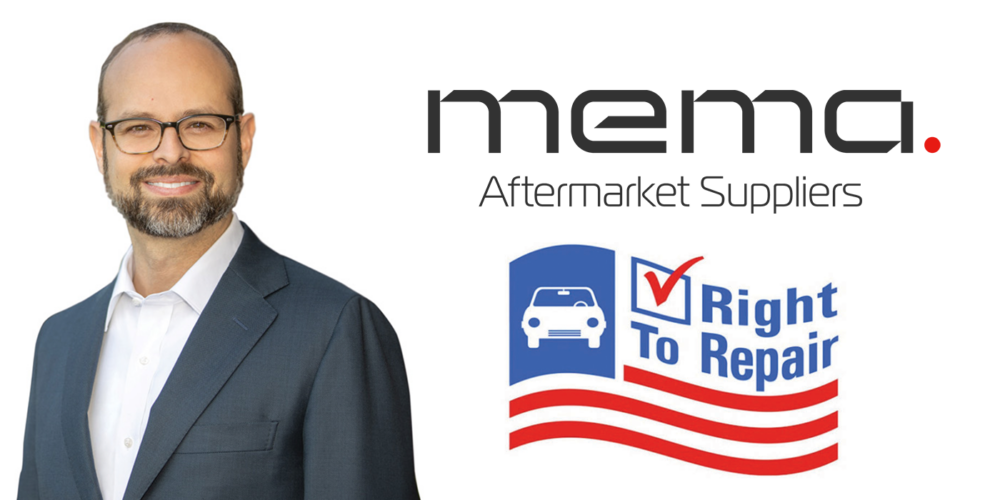The most pressing issue for our industry today is Right to Repair—the right for consumers to have access to their vehicle data. This, in turn, allows them to take their vehicle to the repair facility of their choice and permits the shop to properly diagnose their vehicle, install your company’s aftermarket part and create much needed and cost-effective options when it vehicle repair. While a federal bill is circulating through Congress as you’re reading, the aftermarket needs loud voices and influential companies (like yours!) letting them know its imoortance in order to get it through Congress—and get it passed.
To explain the latest in Right to Repair and why a federal legislation is needed to protect consumer choice, Paul McCarthy, president and CEO of MEMA Aftermarket Suppliers, sat down to answer our questions and explain what aftermarket suppliers can do to champion the cause.
AMN: A lot has happened on the right to repair front this year, including a pact between automakers and independent auto repairers that MEMA said, “falls short.” Can you explain the importance of right to repair for members of MEMA Aftermarket Suppliers?
McCarthy: We view the recent pact between automakers and a small segment of independent auto repairers as a step in the right direction but recognize it also falls quite short of where we need to be for true repair access with consumers at the center. The need for federally legislated repair access is critical for aftermarket suppliers – the pact acknowledges that – and it is also critical for consumers.
If we achieve federal legislation ensuring a free and competitive marketplace, the aftermarket will continue to have a bright future. But it’s important to remember that consumers are at the center of The REPAIR Act (H.R. 906), federal legislation supported by MEMA Aftermarket Suppliers, which allows consumers to continue to make the choice of where and with what parts their vehicles are serviced.
Currently, consumers prefer independent repair shops 70% of the time and for many reasons – price, availability, relationships, trust and convenience. If consumers are unable to make a repair choice based on their priorities, then the ecosystem has shifted, and profit and power have been prioritized above the hundreds of millions of vehicle operators in the U.S.
There is a silver lining here. Automakers have conceded two key points that we and our coalition partners have been advocating for on behalf of our industry for over five years: that there is a repair problem and that there is a need for federal legislation. It is now acknowledged by other stakeholders to Capitol Hill and the wider world that suppliers’ positions on those two points are justified and correct.
Now, the discussion is what will be the content of a federal bill? Will it address the real needs and retain consumer choice and market competition on vehicle maintenance and repair now and far into the future? The federal bill introduced by congressional champions of the aftermarket, The REPAIR Act, addresses the issues we all agree exist and accounts for the meaningful details of our complex U.S. vehicle fleet. The automakers’ agreement, as outlined in their pact, not only creates confusion, but also has numerous substantive flaws.
The REPAIR Act addresses these flaws as follows:
- The Act contains a binding enforcement mechanism.
- The Act applies to all vehicle OEMs, not just those that choose to participate.
- The Act applies to all on-road vehicles including light-duty, medium-duty, and heavy-duty, and motorcycles.
- The Act obligates OEMs to provide vehicle owners or aftermarket direct access to telematically-generated repair and maintenance data rather than requiring access through OEM controlled systems and tools.
- The Act obligates OEMs to give vehicle owners and repair shops access to telematics and diagnostics data beyond that available just through the OBDII port.
- The Act guarantees the ability to use bi-directional communication, to update vehicles and parts to the latest, safest software.
- The Act requires that data access be done in a cybersecure, regulated manner.
- The Act maintains competition for repair parts and services to prevent potential OEM monopolies.
- The Act accounts for future technologies in a way that will not require amendments or additional legislation.
AMN: MEMA Aftermarket Suppliers says the 2014 MOU doesn’t cover what is needed for automakers to comply with right to repair guidelines needed for the independent aftermarket and consumers. Explain why.
McCarthy: The 2014 MOU lacks several crucial aspects that are vital for compliance with right to repair guidelines. It doesn’t sufficiently address the technological advancements and new standards required to provide independent aftermarket and consumers with fair access to repair facilities. The REPAIR Act is designed to fill these gaps and is a comprehensive and critical piece of federal legislation that preserves consumer choice, safety, competition, affordability, accessibility and a vibrant and innovative supply chain.
Perhaps most importantly, by enshrining in law repair principles, accessible, independent enforcement mechanisms and adaptation as future technology shifts, The REPAIR Act could avoid our industry having a continual Right to Repair fight. We have had to have this fight every decade going back to the 1930s – every time technology has advanced. Let’s just do what is right for consumers.
AMN: Cybersecurity is a concern for automakers in giving aftermarket repair providers access to vehicle data. As a head representative for aftermarket suppliers, in what ways is MEMA advocating for the safe transfer of vehicle data?
We strongly support responsible and secure data sharing practices and have written a high standard into The REPAIR Act. It’s important to remember that the automotive aftermarket has a long history of standardized guidelines for secure data transfer, ensuring the integrity and confidentiality of vehicle data. A great example of collaboration and innovation is the aftermarket’s work with the National Automotive Service Task Force (NASTF) on the standards and technician vetting for accessing vehicle key codes.
The aftermarket isn’t pursuing unfettered access to vehicle data. Far from it. Instead, we are asking mutually agreeable requirements and limitations be put into place that protect cybersecurity. And, The REPAIR Act also calls for the National Highway Traffic Safety Administration (NHTSA) to have a role in ensuring that data access provided is in a regulated, cybersecure way.
AMN: Both MEMA Aftermarket Suppliers and the Auto Care Association are pushing for a federal right to repair law. Explain what you feel this law needs to accomplish.
McCarthy: A federal right to repair law should establish a level playing field for all stakeholders in the motor vehicle industry. It must ensure that repair information, tools, and parts are available to both independent and franchised repair shops. The legislation should promote transparency, consumer choice, and foster innovation, while adhering to safety and environmental standards and cybersecurity requirements. Access to an enforcement tool for independent repair shops and vehicle owners will ensure that all parties are complying with the requirements of any law. Collaboration across the industry, as advocated by MEMA Aftermarket Suppliers and the Auto Care Association, is crucial for achieving these goals.
AMN: How far are we with getting a federal right to repair law? How can member companies (and their teams) of MEMA Aftermarket Suppliers spread awareness around right to repair? How are you rallying the industry around this issue?
McCarthy: We cannot emphasize enough how right now, this Congress, is our best shot we have at effectively passing a collaborative bill that ensures what the aftermarket and consumers need. At the time of this writing, we have 39 co-sponsors of The REPAIR Act, and that’s great progress. But we need 100 to send a message to Congress about the level of support for the bill. And to get there, we need each person in the automotive aftermarket to show his/her support. There are many ways to do that, two are especially effective:
- Send an email to your representatives using our online tool and ask them to support The REPAIR Act.
- Work with our D.C. office and host a roundtable and tour at your facility. (Contact Carter Salwin at [email protected]).












